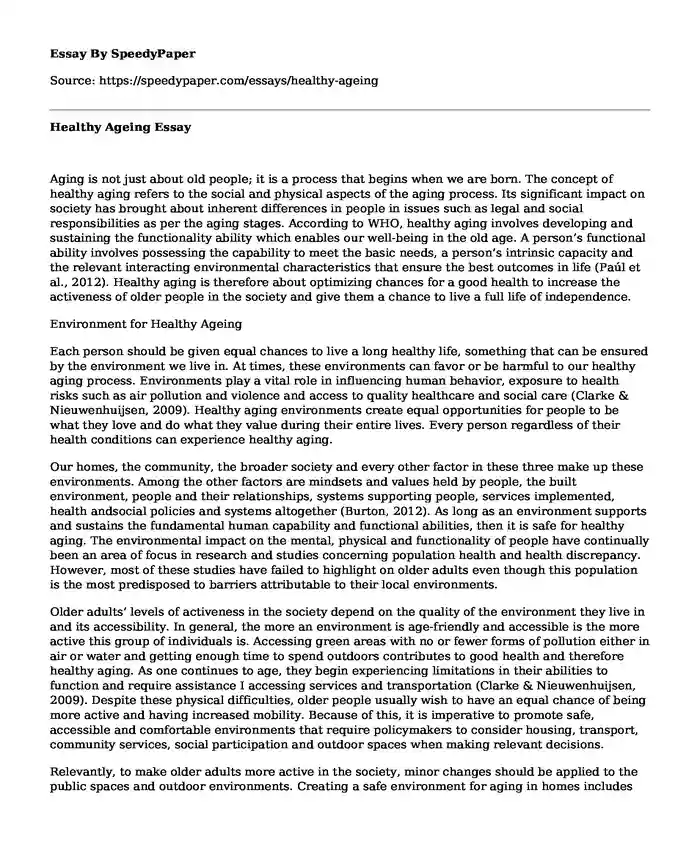
| Type of paper: | Essay |
| Categories: | History United States Economics Finance Personality |
| Pages: | 3 |
| Wordcount: | 708 words |
Aging is not just about old people; it is a process that begins when we are born. The concept of healthy aging refers to the social and physical aspects of the aging process. Its significant impact on society has brought about inherent differences in people in issues such as legal and social responsibilities as per the aging stages. According to WHO, healthy aging involves developing and sustaining the functionality ability which enables our well-being in the old age. A person's functional ability involves possessing the capability to meet the basic needs, a person's intrinsic capacity and the relevant interacting environmental characteristics that ensure the best outcomes in life (Paul et al., 2012). Healthy aging is therefore about optimizing chances for a good health to increase the activeness of older people in the society and give them a chance to live a full life of independence.
Environment for Healthy Ageing
Each person should be given equal chances to live a long healthy life, something that can be ensured by the environment we live in. At times, these environments can favor or be harmful to our healthy aging process. Environments play a vital role in influencing human behavior, exposure to health risks such as air pollution and violence and access to quality healthcare and social care (Clarke & Nieuwenhuijsen, 2009). Healthy aging environments create equal opportunities for people to be what they love and do what they value during their entire lives. Every person regardless of their health conditions can experience healthy aging.
Our homes, the community, the broader society and every other factor in these three make up these environments. Among the other factors are mindsets and values held by people, the built environment, people and their relationships, systems supporting people, services implemented, health andsocial policies and systems altogether (Burton, 2012). As long as an environment supports and sustains the fundamental human capability and functional abilities, then it is safe for healthy aging. The environmental impact on the mental, physical and functionality of people have continually been an area of focus in research and studies concerning population health and health discrepancy. However, most of these studies have failed to highlight on older adults even though this population is the most predisposed to barriers attributable to their local environments.
Older adults' levels of activeness in the society depend on the quality of the environment they live in and its accessibility. In general, the more an environment is age-friendly and accessible is the more active this group of individuals is. Accessing green areas with no or fewer forms of pollution either in air or water and getting enough time to spend outdoors contributes to good health and therefore healthy aging. As one continues to age, they begin experiencing limitations in their abilities to function and require assistance I accessing services and transportation (Clarke & Nieuwenhuijsen, 2009). Despite these physical difficulties, older people usually wish to have an equal chance of being more active and having increased mobility. Because of this, it is imperative to promote safe, accessible and comfortable environments that require policymakers to consider housing, transport, community services, social participation and outdoor spaces when making relevant decisions.
Relevantly, to make older adults more active in the society, minor changes should be applied to the public spaces and outdoor environments. Creating a safe environment for aging in homes includes making small adaptations that will not only reduce falls but help older people gain independence and enjoy a good life without having to feel like they are a burden to their caregivers (Burton, 2012). Among the significant causes of hospitalization for old people are falls. Pollution such as air and water are the environmental threats disproportionally affecting healthy, and these pollutions impose substantial burdens on the public health systems. Millions of people worldwide suffer from respiratory problems, and a majority are the socially and economically deprives and the older adults. We should collectively work towards providing safe environments for a healthy life and healthy aging.References
Burton, E. (2012). Streets ahead? The role of the built environment in healthy ageing. Perspectives in public health, 132(4), 161.
Clarke, P., & Nieuwenhuijsen, E. R. (2009). Environments for healthy ageing: A critical review. Maturitas, 64(1), 14-19.
Paul, C., Ribeiro, O., & Teixeira, L. (2012). Active ageing: an empirical approach to the WHO model. Current gerontology and geriatrics research, 2012.
Cite this page
Healthy Ageing. (2022, Jul 18). Retrieved from https://speedypaper.net/essays/healthy-ageing
Request Removal
If you are the original author of this essay and no longer wish to have it published on the SpeedyPaper website, please click below to request its removal:
- Free Essay on Crime Scene Investigation Procedures
- Information Technology Thesis - Free Essay
- Free Essay Example on The Everglade Region
- How Does Religion Affect Individuals and Society? Essay Example
- EFL/ESL Book Analysis for Beginners, Essay Sample
- Free Paper Analyzing the Theme of Journalism in a Documentary Film and an Essay
- Free Essay on Developing an Infant-Toddler Curriculum
Popular categories




